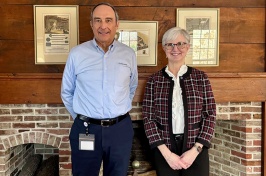Nicholas Gosling '06
Nicholas Gosling '06's Articles
-
Electromagnetic Therapy Potential Tool for Improving Dairy Herd Health
UNH partners with MagnaWave to explore pulsed electromagnetic therapy for dairy cows, showing promise for mastitis treatment and udder health improvement. -
Living Labs: How Experimental Forests Offer Insights into Small Mammal Population Dynamics
UNH study reveals how small mammals adapt reproduction to forest seed cycles, influencing seed dispersal, tree regeneration, and forest ecosystem resilience. -
Unlocking Nature’s Ice-Binders
UNH scientists study antifreeze proteins to improve cryopreservation methods, aiming to revolutionize medicine, agriculture, and biotechnology with ice-binding solutions. -
Could Manure Help Cool-Climate Farmers Get Closer to Year-Round Farming?
UNH scientists innovate manure-powered systems to heat greenhouses, extending growing seasons for small farms while boosting sustainability and reducing emissions. -
In Consideration of New Approaches to Wildlife Research
UNH research reveals gaps in wildlife studies, calling for a balanced focus on smaller species to guide conservation efforts and prevent biodiversity loss. -
Phytoplankton Monitoring in Gulf of Maine as a Signal of Climate Change Impacts
UNH researchers study phytoplankton dynamics in the Gulf of Maine to understand climate change impacts, marine biodiversity shifts, and sustainable ecosystem management. -
How Migratory Marine Life Connects Ecosystems from New England to Florida
Discover how UNH researchers use acoustic telemetry to track migratory patterns of marine species, revealing insights for sustainable fisheries and conservation. -
Rising Above Traditional Crop Disease Scouting
Discover how UNH researchers are using drones to detect crop diseases early, offering affordable solutions to support New England's small and mid-sized farms. -
Sustainability: From the Ground Up
UNH's Soil BioME team collaborates with industry to explore soil microbes' role in sustainability, tackling climate change, nitrogen efficiency, and carbon reduction. -
Coyotes Thrive Despite Human and Predator Pressures
UNH research reveals how human hunting and competition with large predators influence coyote populations, shedding light on their adaptability across New Hampshire. -
Innovations in New Hampshire Aquaculture
Discover how aquaculture research supported by the New Hampshire Agricultural Experiment Station is advancing sustainability, from oyster health monitoring to combating sea lice to supporting marine... -
Synthetic Microbiomes: Building Plant Defenses for a Changing Climate
UNH researchers explore how synthetic microbiomes can help plants like duckweed adapt to climate change, boosting resilience and aiding in environmental sustainability. -
New Leadership at the NH Water Resources Research Center Continues Mission of Environmental Innovation
The NH Water Resources Research Center, now led by Adam Wymore, continues its mission to innovate and safeguard New Hampshire's water resources amid climate challenges. -
Warming and Nitrogen Enrichment Lead to Surprising Soil Carbon Dynamics
UNH study reveals that despite warming and nitrogen enrichment, soil carbon in New England forests remains stable due to plant inputs, challenging earlier predictions. -
Lessons from Rain and Snow
Long-term studies from UNH reveal changing nitrogen deposition in NH, highlighting potential impacts on water quality, plant growth, and ecosystem health amid climate change. -
Estrogen in Clover?
Researchers at UNH find drought increases phytoestrogen levels in red clover, impacting dairy cows’ health. Kura clover shows promise as a resilient forage alternative. -
Innovations in Dairy: UNH Researchers Drive Advancements in Dairy Farming
Discover how innovative research at New Hampshire Agricultural Experiment Station is transforming dairy farming with sustainable practices, healthier calves, and methane-reducing feeds. -
Rediscovering Lost Flora: The Extinction of a Native New Hampshire Crabgrass
Discover the extinct Digitaria laeviglumis, a unique crabgrass identified with the help of UNH’s Hodgdon Herbarium. Learn about the crucial role of herbaria in preserving biodiversity. -
Marine Heatwaves’ Impacts on Marine Organisms
New UNH research develops a biological approach to understanding marine heatwave effects, offering detailed insights into the impacts on marine life and mitigation strategies. -
Optimizing Lumpfish Rearing
UNH research shows that adjusting light and density in lumpfish hatcheries reduces aggression, enhancing their role in controlling sea lice in salmon farms. -
Global Experts Convene at UNH to Discuss Illegal Fishing
Discover the Blueberry Gall Midge Complex and its impact on agriculture. Learn how taxonomic research aids pest management and promotes sustainable farming practices. -
New Species Discovery: Unraveling the Blueberry Gall Midge Complex
Discover the Blueberry Gall Midge Complex and its impact on agriculture. Learn how taxonomic research aids pest management and promotes sustainable farming practices. -
Using Duckweed as a Green Manure
Discover UNH research on using duckweed to cleanse water and serve as green manure for sustainable farming. -
Sustainable Shrimp Farming: Reducing Nitrogen Using Seaweed and Oysters
Discover how UNH researchers use integrated multi-trophic aquaculture (IMTA) with seaweed and oysters to reduce nitrogen pollution in sustainable shrimp farming. -
UNH Receives USDA Grant to Boost Climate-Resilient Farming Practices
UNH receives USDA grant to explore crop row orientation and cover cropping strategies, aiming to boost climate-resilient farming practices and enhance soil health. -
Microplastics in Estuaries
Estuaries in New England are crucial for wildlife and aquaculture, but microplastics pose a growing threat. UNH researchers are studying microplastic movement and accumulation to mitigate risks. -
Aquatic Plants Could Help Reduce Water Pollution
Tiny aquatic plants called duckweed and their microbes could be engineered to cleanse chemicals from runoff water. Anna O'Brien's research at UNH aims to improve stormwater management using these... -
Best Radicchio Varieties for New England Farmers
Granite State farmers can boost sustainability by adding high-demand radicchio to their crops, and research at UNH is aiding that effort by identifying top-performing varieties for New England's... -
Regenerating Northern Oak Forests Using Prescribed Fire
Research at UNH explores prescribed fire to boost Northern red oak regeneration, ensuring its ecological and economic benefits in New England's forests and timber industry. -
For Dairy, Focusing on the Essentials
Discover how New Hampshire Agricultural Experiment Station's research using Agolin in organic dairy cow feed can boost milk production and reduce methane emissions, aiding climate efforts. -
Out of This World Whelk Eggs
UNH researcher Elizabeth Fairchild is leading a study examining the effects of changing water temperatures on the fertility and reproduction of channeled whelk. -
UNH’s Easton White Named to UN’s World Ocean Assessment Working Group
UNH COLSA faculty joins UN to assess global oceans for WOA III, focusing on sustainability and leveraging new technologies for ocean management. -
Maine Farmers Receptive to Seaweed Feed
New research involving UNH scientists reveals Maine organic dairy farmers prioritize cost and supply issues but are open to paying more for sustainable, methane-reducing feed. -
Alternative Syrups: What Are They and How Can They Improve Resiliency of Maple Syrup Industry?
UNH doctoral candidate David Moore, a member of the Ecohydrology Lab at the UNH College of Life Sciences and Agriculture, led research into best management practices for harvesting and producing... -
UNH’s Russ Congalton Awarded 2023 William T. Pecora Award for Achievements in Remote Sensing and Earth Observation
UNH's Russ Congalton receives the prestigious William T. Pecora Award from USGS and NASA, honoring his excellence in satellite and aerial remote sensing. -
Secretary of Agriculture Tom Vilsack Holds Town Hall at the University of New Hampshire
U.S. Secretary of Agriculture Tom Vilsack discusses farm consolidation, land loss, and rural healthcare at UNH, emphasizing support for small farms and community well-being. -
Spotlight on Research: N.H.’s North Country
Explore New Hampshire's North Country: A vital economic and cultural region, with COLSA research on moose conservation, forest management, and invasive impacts. -
Revolutionizing Health
Discover the 'One Health' model at HCGS: Interdisciplinary genomic research for human, animal, and environmental health. Innovating for global wellness. -
Reducing Barriers to Local Food Systems in New Hampshire
With support from the NHAES, UNH scientists are studying methods to better connect farmers to markets and consumers, and examining ways of improving local food access for Granite Staters. -
UNH Hubbard Center to Offer Long-Read Genomic Sequencing
UNH's HCGS integrates PacBio Sequel lle & Nanopore GridION for advanced long-read DNA sequencing, boosting accuracy in plant and microorganism studies. -
From New Hampshire to Maryland: A Kiwiberry Road Trip
UNH's kiwiberry research gets a boost from a new NE SARE grant, advancing regional agriculture with innovative, sustainable farming practices. -
Breaking the Sound Barrier: Pioneering Study Reveals Noise Inequity in Redlined Communities
UNH researcher part of study that reveals higher noise in redlined areas, impacting health of people and wildlife in urban ecology research. -
Conservation Planning Through Genetic Monitoring
Explore UNH's groundbreaking study on conserving the endangered saltmarsh sparrow through genetic monitoring, highlighting key strategies against habitat degradation and climate impact. -
A Global Exchange: COLSA Summer Scholars Engage in Ag Sciences
Explore how the University of New Hampshire's College of Life Sciences and Agriculture bridges students to global opportunities through experiential learning and research. -
Bolstering Fish and Dairy Consumption in the Granite State
UNH research enhances SNAP, supporting NH's vulnerable communities through tailored nutrition education, fresh food access, and improved public health. -
Tartary Buckwheat: A Climate-Ready Crop for the Future
Discover Tartary Buckwheat: The Climate-Resilient Superfood. UNH researchers explore this nutritious grain's potential in the face of changing weather patterns. -
Monitoring Harmful Algal Blooms Using Drones
UNH researchers use drones equipped with sensors to identify cyanobacteria blooms — also known as harmful algal blooms — in New Hampshire lakes faster and more effectively. -
UNH's Center of Integrated Biomedical and Bioengineering Research Receives $10M NIH Grant
New $10M, Phase 2 NIH grant will help fuel ground-breaking innovations in health and disease solutions at the Center of Integrated Biomedical and Bioengineering Research. -
Linking Food Access, Fiber Intake, Gut Microbiota & Health Outcomes Among NH Hispanic Residents
Unlocking Health Insights: UNH Research on Food Access, Fiber, Gut Health & Hispanic Communities in NH. Learn more about the FIRST study. -
Bringing Oysters Back to NH’s Great Bay
UNH COLSA scientists work on restoring oyster reefs in New Hampshire Great Bay, supporting the state's burgeoning oyster industry.

































































































